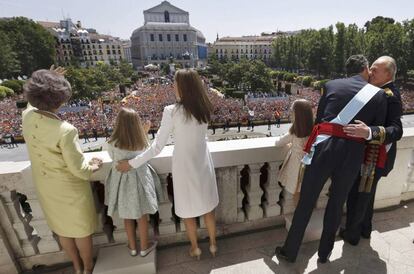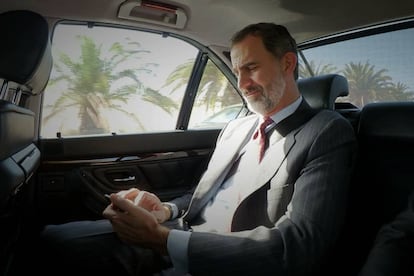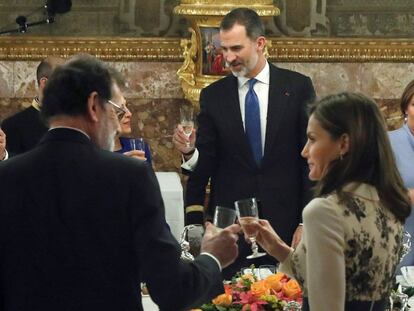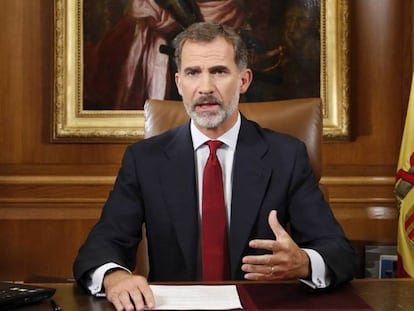Felipe VI: How the Catalan crisis has marked the first phase of his reign
The current king is the first monarch to have sworn on the 1978 Spanish Constitution, something his unflinching stance on the independence drive reflects


On October 3, three years and three months after becoming the new king of Spain, Felipe VI made his riskiest move. In a solemn tone, he addressed Spaniards to spell out the red lines that cannot be crossed in this country. After denouncing the “unacceptable disloyalty” of the Catalan government, the monarch warned that “it is the responsibility of the legitimate powers of the state to ensure constitutional order.” This opened the door to the application of Article 155 of the Spanish Constitution.
Just like his father Juan Carlos I did during the failed coup of February 23, 1981, Felipe VI staked his crown on a single card. But unlike in 1981, the Spanish government was not being held hostage, and just hours before his televised address to the nation he had met with Prime Minister Mariano Rajoy. It had not yet been 48 hours since the illegal referendum of October 1 and the damage to the Spain brand caused by the use of police truncheons at the polling stations; furthermore, a unilateral independence declaration was still to come. The king could not remain silent.
His speech made no concessions: there were no calls for dialogue, no words spoken in Catalan, even though Felipe VI is fluent in the language. “It was not the right time for that,” say sources who are close to the monarch. “The message was not just aimed at Catalans, but at all Spaniards.”
The king made no concessions: there were no calls for dialogue, no words spoken in Catalan, even though he is fluent in the language
It was quite a disappointment for those who were expecting the king – whom the Constitution describes as an arbiter and moderator – to mediate between the central and Catalan governments. “The king arbitrates and moderates the regular functioning of institutions,” said the same sources, paraphrasing Article 56 of the Constitution. But he cannot remain neutral before those who violate the Constitution and the law. The then-Catalan premier Carles Puigdemont must have surely known that the king is the symbol and guarantor of the Spanish unity that he himself was trying to break up.
His October 3 address did not erode Felipe VI’s image. On the contrary, it seems to have bolstered it across the country as a whole, with the exception of that half of Catalonia that has turned its back on Spain. The king’s last Christmas address was seen by 63.8% of viewers in Spain as a whole compared with 39.6% in Catalonia, the region where his audience share was the lowest.

The king does not run for office, but that does not mean that he does not submit to citizen scrutiny. The royal household regularly checks the state of public opinion about the monarchy. Juan Carlos’s decision to abdicate in June 2014 took into account his own sharp drop in popularity after a more than three-decade honeymoon period with Spanish society. In 2011, after the Nóos scandal broke, the Center for Sociology Studies (CIS) logged the first failing grade for the monarchy (4.89 out of 10); the king’s accident during a hunting expedition to Botswana dragged this figure down to an all-time low (3.68) and it did not improve until after the transfer of power to his son Felipe. In April 2015, nearly a year after Felipe VI’s coronation, opinion polls were showing a slight recovery in public trust in the royal institution (4.34).
Since then, Spain’s main public opinion institute has not asked citizens again what they think of their head of state. Instead, it is necessary to turn to private surveys to get a sense of his popularity. José Juan Toharia, president of polling company Metroscopia, says that the king gets a high grade of around 7; that this figure has remained stable; and that Felipe VI’s popularity levels remain similar across age groups and social classes. He enjoys broad support among voters of the conservative Popular Party (PP), the Socialist Party (PSOE) and center-right group Ciudadanos, while Podemos supporters are divided on the issue.
The king’s last Christmas address was viewed by 63.8% of viewers in Spain as a whole compared with 39.6% in Catalonia
“Ideologically, there are very few Spaniards who are royalists in the sense of preferring a head of state who inherits the post rather than being elected to it,” says Toharia. “But most Spaniards are pragmatic, and they value the way that Felipe VI does his job. They see him as an honest, well-trained and competent professional, a high-ranking government worker in the Scandinavian sense of the term. In Spain, it is the king who brings legitimacy to the institution and not the other way around.”
Born in Madrid in 1968, Felipe VI is the best-educated king in Spanish history. He has a degree in law, did pre-university studies in Canada and received a master’s degree in International Affairs from Georgetown University in Washington. He also studied at all three military academies, and carried the flag at the Barcelona Olympics of 1992, where he competed in sailing events.

His most important personal decision was to marry for love. On May 22, 2004 he wed Letizia Ortiz, a divorced television news journalist, triggering an outcry among the more old-fashioned sectors of the Spanish right. And his most painful decision was taken in June 2015, when he stripped his own sister Cristina of her Duchess of Palma title after the latter refused to give up her rights to the throne despite being ensnared in the Nóos corruption scandal.
His brother-in-law Iñaki Urdangarín’s criminal conviction, which is still pending confirmation by the Supreme Court, still hangs like a sword over him. But the first thing that Felipe VI did when he took over his father’s duties was to create a firewall: he reduced the members of the Royal Family to six (his parents, himself, his wife and their two daughters), he forbade its members from working in the private sector or accepting expensive gifts, and he had the royal household’s expenses audited. These expenses were €7.8 million in 2017. This effort at transparency is not complete, however, since many royal costs are covered by government ministries.
There are very few Spaniards who are royalists in the sense of preferring a head of state who inherits the post rather than being elected to it
José Juan Toharia, president of polling company Metroscopia
Still, the Spanish monarchy is cheaper than the presidencies of some republics, notes Toharia, and Spaniards appreciate that as well. Theirs is a king without courtesans heading a monarchy with hardly any royalists in it.
After dealing with in-house affairs, Felipe VI was forced to deal with a political upheaval that has stretched the seams of the 1978 Constitution. The national elections of December 2015 confirmed the end of the two-party system in Spain and ushered in a new period of political fragmentation. An openly anti-royal party, Podemos, earned 20% of the votes.
In January 2016, Rajoy declined the king’s request to try to form a government, and the country moved into uncharted waters as political deadlock took hold. Felipe VI was faced with a dilemma: should he seek a way out of the deadlock, as some voices were suggesting? But the king did not fall prey to the temptation, and in the middle of the storm he followed the course set by the Constitution. There were new elections in June 2016, and after five rounds of talks with party leaders, Rajoy was reappointed as the Spanish prime minister in October of that year.
With national politics back on track, the king went back to his international activities, which is what Spaniards value the most in him. Felipe VI’s taste for international relations also makes up for the marked dislike for travel shown by recent heads of government. The king has been to Portugal, Saudi Arabia, Japan, and most recently the World Economic Forum in Davos, to which Rajoy has never been.
Felipe VI is the first king to swear on the Constitution and whose legitimacy stems directly from the same (his father was appointed by Franco). But those who know him say that he would never stand in the way of constitutional reform. On the contrary, during his last Christmas address to the nation, Felipe VI talked about “adapting to the new times.” But the how and the when are not up to him to decide.
English version by Susana Urra.
Tu suscripción se está usando en otro dispositivo
¿Quieres añadir otro usuario a tu suscripción?
Si continúas leyendo en este dispositivo, no se podrá leer en el otro.
FlechaTu suscripción se está usando en otro dispositivo y solo puedes acceder a EL PAÍS desde un dispositivo a la vez.
Si quieres compartir tu cuenta, cambia tu suscripción a la modalidad Premium, así podrás añadir otro usuario. Cada uno accederá con su propia cuenta de email, lo que os permitirá personalizar vuestra experiencia en EL PAÍS.
En el caso de no saber quién está usando tu cuenta, te recomendamos cambiar tu contraseña aquí.
Si decides continuar compartiendo tu cuenta, este mensaje se mostrará en tu dispositivo y en el de la otra persona que está usando tu cuenta de forma indefinida, afectando a tu experiencia de lectura. Puedes consultar aquí los términos y condiciones de la suscripción digital.










































